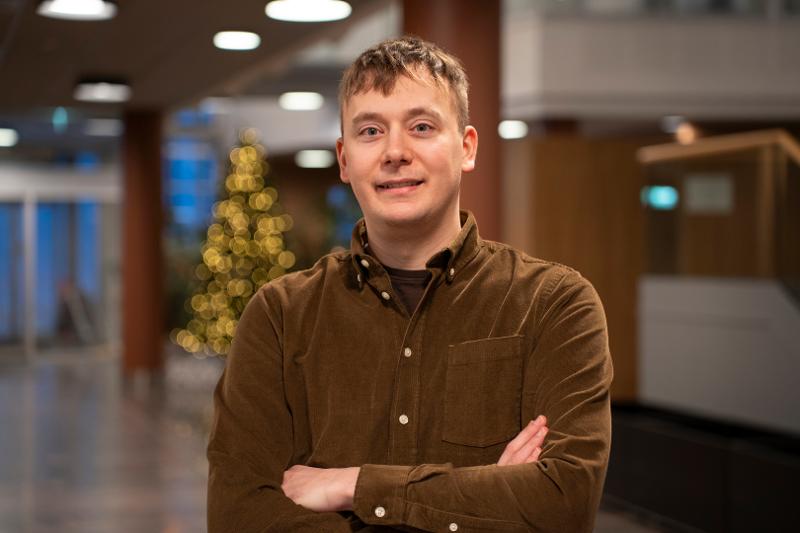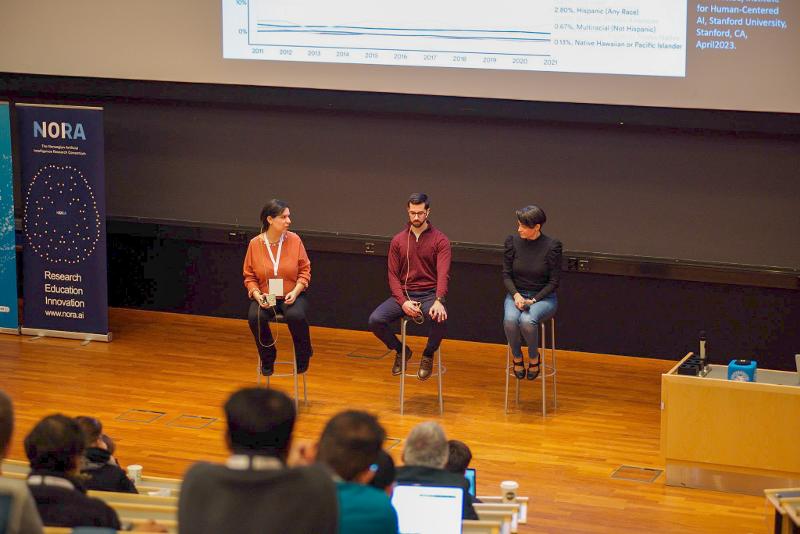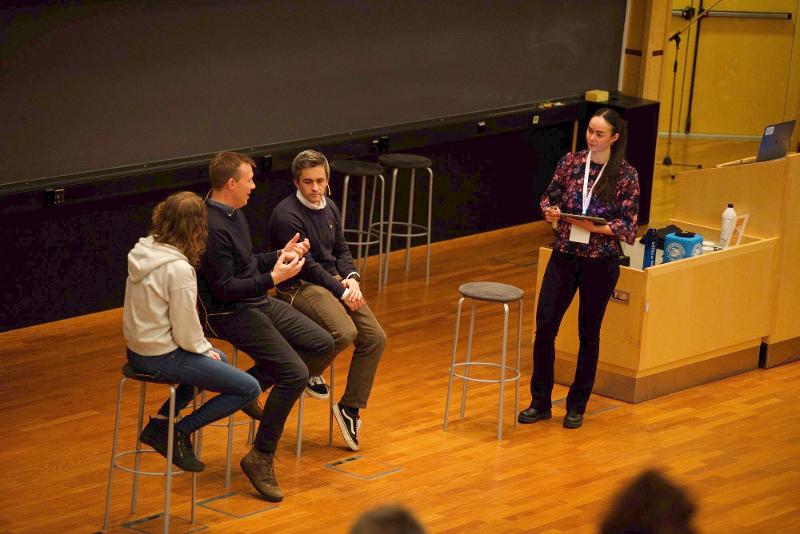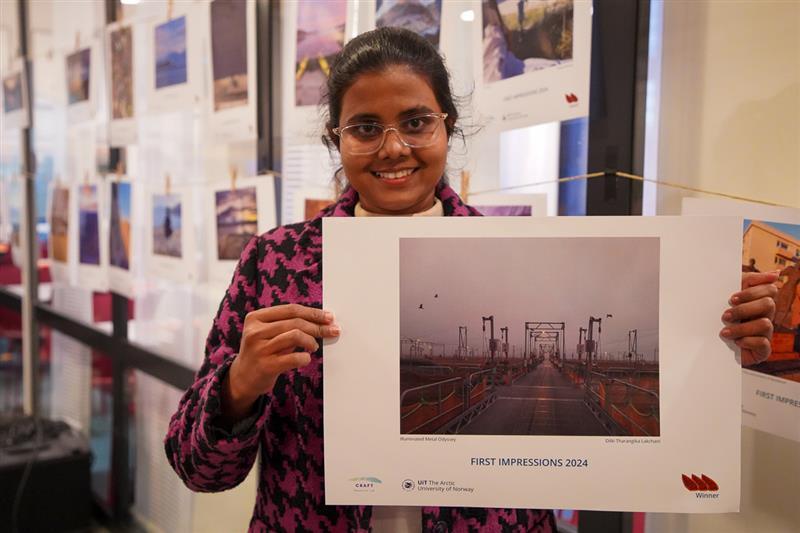250 researchers at the world's northernmost conference on Artificial Intelligence
In the second week of January, researchers from all over the world gather in Tromsø to share and learn about the latest developments in artificial intelligence research.
The Northern Lights Deep Learning Conference (NLDL) is the world's northernmost conference on artificial intelligence (AI) and deep learning. This year it is being held from 7th to 9th January at UiT in Tromsø.
Showcasing the latest from the AI Field
The conference serves as a platform where international researchers exchange experiences and expertise in AI research. This encourages participants to establish new future research collaborations within the field.
“NLDL also attracts a broad range of industrial players and can offer a variety of events aimed at the industry," says Professor of Machine Learning at UiT, Michael Kampffmeyer. He is one of the main organisers of NLDL 2025.

Leading AI researchers also come to present top-tier research from institutions such as Linköping University, Radboud University, and KU Leuven. At the same time, several participants showcase the latest results from their own research.
Education of younger researchers is a major focus through NLDL's winter school, which is a five-day course where participants learn about current topics in AI from renowned experts.
Diversity and Inclusion Important
Only 30 per cent of those working in AI worldwide are women. Representatives with a background from scientific research, public administration, and industry meet during the sub-event "Diversity in AI" to address the lack of diversity and inclusion within the AI field.
The aim is to discuss measures to promote diversity within the field and ensure equality for future generations of AI researchers.

"Public institutions, academia, and industry should actively work to improve diversity and increase the visibility of underrepresented groups within AI and technology. This year, we delve deeper into how AI can unconsciously reinforce societal biases, and how misinformation or incomplete data can lead to unfair AI systems," says Kampffmeyer.
Focus on AI in business
AI is increasingly being used in sectors such as healthcare, fisheries, finance, and transport. During the sub-event "Industry and AI," participants from business and research gather to discuss the importance, opportunities, and challenges of AI within industry and business.

Important questions will be raised during the event, such as why AI is important for Norwegian business, the problems AI can potentially solve, and how academia and industry should collaborate to create safe and sustainable AI technology.
"AI has enormous potential to create added value for industry, but there are still significant gaps between the development of methods and the actual use of AI. This session facilitates dialogue between actors from academia and industry," says Kampffmeyer.
Business actors from, among others, the Norwegian Digitalisation Agency, Nav, Ap Sensing GmbH, and Avju Solutions will also attend NLDL 2025 to discuss how AI is used in their companies and organisations during "Meet the AI Industry." The event is held on 9 January at Storgata Camping in Tromsø and is open and free for all.
NLDL is organised by the research centre SFI Visual Intelligence and UiT's research group for machine learning, in collaboration with the Norwegian Artificial Intelligence Research Consortium (NORA) as the main partner.
-
Fiskeri- og havbruksvitenskap - bachelor
Varighet: 3 År -
Fiskeri- og havbruksvitenskap - master
Varighet: 2 År -
Akvamedisin - master
Varighet: 5 År -
Bioteknologi - bachelor
Varighet: 3 År -
Arkeologi - master
Varighet: 2 År -
Computer Science - master
Varighet: 2 År -
Geosciences - master
Varighet: 2 År -
Technology and Safety in the High North - master
Varighet: 2 År -
Physics - master
Varighet: 2 År -
Mathematical Sciences - master
Varighet: 2 År -
Molecular Sciences - master
Varighet: 2 År -
Luftfartsfag - bachelor
Varighet: 3 År -
Arkeologi - bachelor
Varighet: 3 År -
Informatikk, datamaskinsystemer - bachelor
Varighet: 3 År -
Informatikk, sivilingeniør - master
Varighet: 5 År -
Geovitenskap- bachelor
Varighet: 3 År -
Kjemi - bachelor
Varighet: 3 År -
Samfunnssikkerhet - bachelor
Varighet: 3 År -
Automasjon, ingeniør - bachelor (ordinær, y-vei)
Varighet: 3 År -
Samfunnssikkerhet - master
Varighet: 2 År -
Farmasi - master
Varighet: 2 År -
Romfysikk, sivilingeniør - master
Varighet: 5 År -
Klima og miljøovervåkning, sivilingeniør - master
Varighet: 5 År -
Bærekraftig teknologi, ingeniør - bachelor
Varighet: 3 År -
Forkurs for ingeniør- og sivilingeniørutdanning
Varighet: 1 År -
Anvendt fysikk og matematikk, sivilingeniør - master
Varighet: 5 År -
Praktisk-pedagogisk utdanning for trinn 8-13 - årsstudium (deltid)
Varighet: 2 År -
Internasjonal beredskap - bachelor (samlingsbasert)
Varighet: 3 År -
Datateknikk, ingeniør - bachelor (y-vei)
Varighet: 3 År -
Droneteknologi, ingeniør - bachelor
Varighet: 3 År -
Bygg, ingeniør - bachelor
Varighet: 3 År -
Bygg, ingeniør - bachelor
Varighet: 3 År -
Bygg, ingeniør - bachelor (y-vei)
Varighet: 3 År -
Datateknikk, ingeniør - bachelor
Varighet: 3 År -
Datateknikk, ingeniør - bachelor
Varighet: 3 År -
Elkraftteknikk, ingeniør - bachelor
Varighet: 3 År -
Elektronikk, ingeniør - bachelor
Varighet: 3 År -
Elektronikk, ingeniør - bachelor (y-vei)
Varighet: 3 År -
Maskin, ingeniør - bachelor
Varighet: 3 År -
Maskin, ingeniør - bachelor (nettbasert)
Varighet: 3 År -
Maskin, ingeniør - bachelor (y-vei)
Varighet: 3 År -
Satellitteknologi, ingeniør - bachelor
Varighet: 3 År -
Satellitteknologi, ingeniør - bachelor (y-vei)
Varighet: 3 År -
Applied Computer Science - Master
Varighet: 2 År -
Electrical Engineering - Master
Varighet: 2 År -
Engineering Design - Master
Varighet: 2 År -
Industrial Engineering - Master
Varighet: 2 År -
Aerospace Engineering - master
Varighet: 2 År -
Bygg og miljø, sivilingeniør - master
Varighet: 2 År -
Bibliotek- og dokumentasjonsvitenskap - årsstudium
Varighet: 1 År

